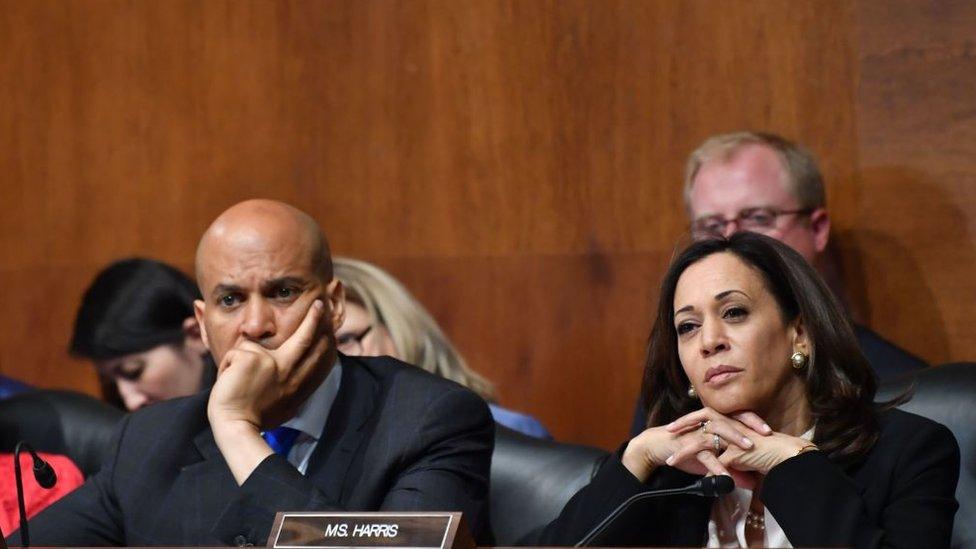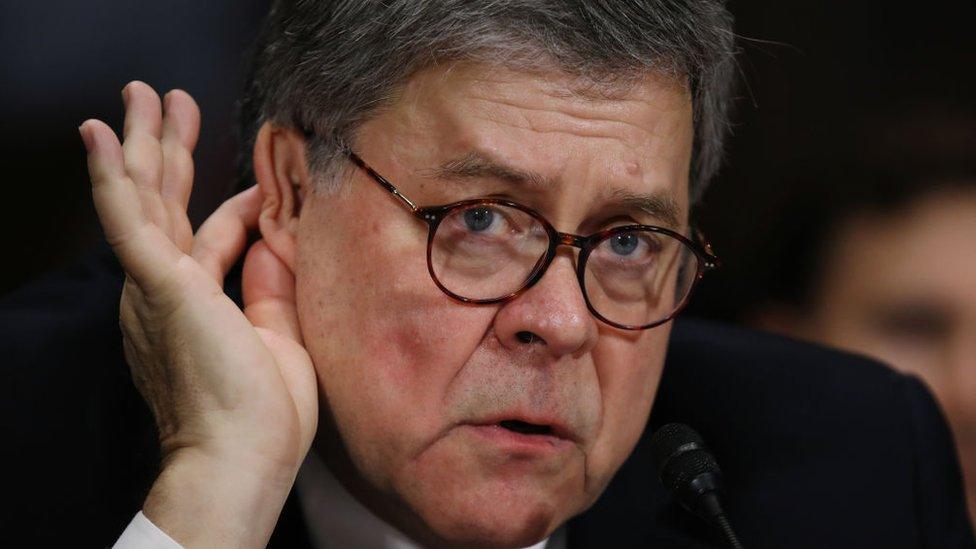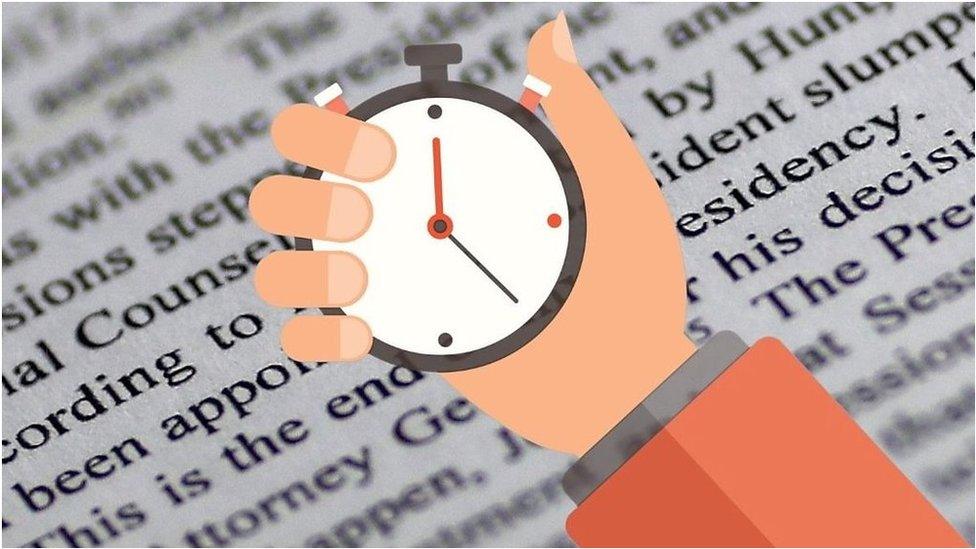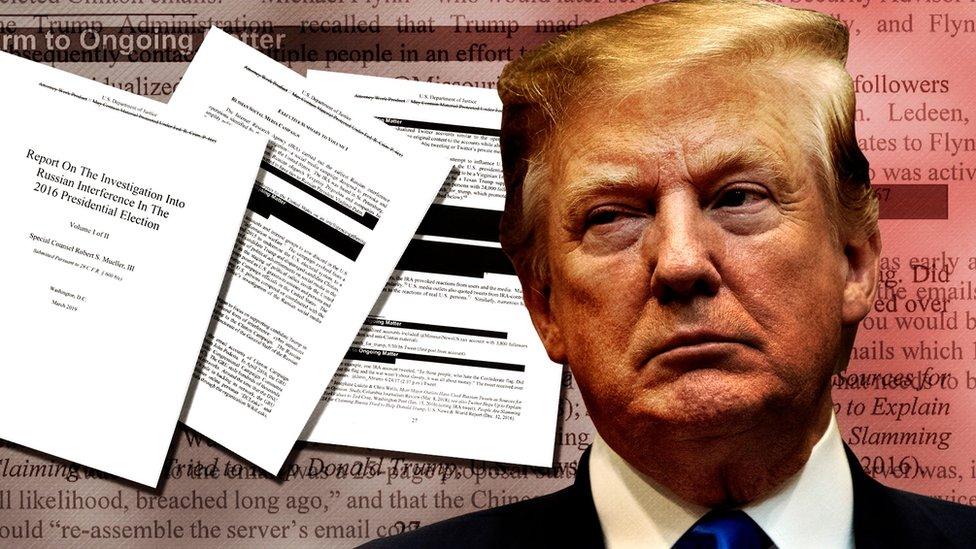Attorney General Barr defends handling of Mueller report amid furore
- Published
Attorney General Barr defends his summary of the Mueller report
The US attorney general has defended his handling of the Russia inquiry amid complaints he misrepresented the special counsel's findings.
William Barr was grilled about his decision to clear the president of obstruction of justice while appearing before a Senate panel.
His testimony came after revelations that Mr Mueller expressed frustration over the summary of the report.
Mr Mueller is expected to testify to Congress later this month.
The attorney general, the nation's top legal official, testified for the first time on Wednesday since releasing Special Counsel Robert Mueller's 448-page report, which found there was no collusion between Russia and President Donald Trump's campaign in the 2016 election.
But the report did not exonerate the president of obstruction of justice in his alleged attempts to undermine Special Counsel Mueller.
Mr Barr, who was appointed by Mr Trump, told the Senate Judiciary Committee he was "frankly surprised" Mr Mueller did not reach a conclusion on whether the president had tried to obstruct justice.
He added that he was "absolutely" confident in his own judgment that Mr Trump did not unlawfully attempt to impede the investigation.
"I think that if he felt that he shouldn't go down the path of making a traditional prosecutorial decision, then he shouldn't have investigated," he said.
Mueller 'frustrated' with Barr summary
The attorney general's testimony to Congress came after a letter he received from Mr Mueller was made public, in which the special counsel said Mr Barr's summary "did not fully capture the context, nature and substance" of his report's findings, and caused "public confusion about critical aspects of the results of our investigation".
The letter, dated 27 March, expressed Mr Mueller's frustration that Mr Barr did not release the executive summaries prepared by the special counsel's team. Mr Mueller said he shared these concerns two days earlier.
During the hearing, Mr Barr said that Mr Mueller was not concerned with the accuracy of the summary but with how it was being reported by media.
"My understanding was his concern was not the accuracy of the statement of the findings in my letter, but that he wanted more out there to provide additional context to explain his reasoning and why he didn't reach a decision on obstruction," he said.
The Mueller report - in 60 seconds
Mr Barr argued that the objections to his summary should be nullified by the release of the report itself, calling the controversy surrounding the summary, and the consequent hearings, "mind-bendingly bizarre".
"I made clear from the beginning that I was putting out the report, as much of the report as I could, and it was clear it was going to take three weeks or so, maybe four, to do that," Mr Barr said.

Calm under pressure

William Barr is a veteran Washington lawyer. In Senate testimony on Wednesday, he sounded like one. When Democrats grilled the attorney general on his handling of the Mueller investigation, his answers were carefully parsed and narrowly focused.
He disputed that he misled Congress last month when he said he didn't know about the Mueller team's dissatisfaction with his four-page letter summarising the concluded Russia inquiry. That unhappiness, he said, was over media portrayal of the letter, not the letter itself. And besides, he was talking to Mr Mueller himself, not his "team".
Then there were the specific instances of possible obstruction Mr Mueller highlighted in the report - which Mr Barr concluded didn't constitute a crime. He had an explanation for them all.
Did Mr Trump instruct Don McGahn to fire Mr Mueller and lie about it? No, Mr Barr said, the president told his former White House counsel to suggest that Mr Mueller be "replaced" because of a conflict of interest - and then write a memo to correct inaccurate media reports.
And on it went. Democrats will view this as an attorney general protecting his presidential boss. Republicans will see it as the nation's top lawyer defending the rule of law.
This sets the stage for the day - perhaps soon - when Mr Mueller himself will testify to Congress. It's one thing to hear what Mr Barr thinks of the Mueller investigation's conclusions. The main event will be when Mr Mueller explains it for himself.

What else did Barr say?
Attorney General Barr also blamed Mr Mueller for delaying the report's full release. He said Mr Mueller's team declined to flag sensitive material, as he requested, creating more work for the justice department to redact grand jury material.
In response to questions from Senator Richard Blumenthal, Mr Barr said he "did not exonerate" Mr Trump in his summary or subsequent public statements - directly contradicting the stance of the White House.
"I said that we did not believe that there was sufficient evidence to establish an obstruction offence," he added.
Ahead of the hearing, Mr Trump issued as series of tweets, again asserting his innocence.
Allow X content?
This article contains content provided by X. We ask for your permission before anything is loaded, as they may be using cookies and other technologies. You may want to read X’s cookie policy, external and privacy policy, external before accepting. To view this content choose ‘accept and continue’.


Democratic presidential contenders Cory Booker and Kamala Harris are both committee members
Later, when pressed by Mr Blumenthal again, Mr Barr referred to Mr Mueller's letter as "a bit snitty", and suggested it was not penned by the special counsel himself.
"I suspect it was written by a member of his staff," Mr Barr said.
During a heated exchange with Democratic Senator Sheldon Whitehouse, Mr Barr argued that Mr Mueller's concerns about releasing his executive summaries did not matter as the special counsel was acting as a US attorney under his authority.
After Mr Mueller submitted the report, "it was my baby", Mr Barr said.
Republican Senator Charles Grassley asked Mr Barr whether the justice department planned to look into allegations of improper surveillance of Mr Trump's presidential campaign before the 2016 election.
Mr Barr revealed that he has asked some of his staff to investigate those allegations of "spying", adding that he would report any conclusions to Congress.
Democratic presidential hopeful Senator Kamala Harris pressed Mr Barr on whether he personally reviewed the special counsel's "great deal of evidence" before reaching a conclusion on whether the president obstructed justice.
The attorney general responded "no", adding he "accepted the statements in the report as factual record".

Mr Barr gestures to his ear after he was unable to hear a senator's question
Senator Harris joined a chorus of Democrats who have called on Mr Barr to resign.
Mr Barr also said he would not recuse himself from ongoing investigations drawn from the Mueller report.
In a tweet, White House press secretary Sarah Sanders tweeted that Mr Barr had served the president "honourably".
"Democrats only disgrace and humiliate themselves with their baseless attacks," she posted.
Mr Barr meanwhile cancelled his scheduled Thursday testimony before the Democratic-led House Judiciary Committee.
He had previously objected to a plan for lawyers to ask questions at the hearing.
House Judiciary Chairman Jerry Nadler has threatened to subpoena Mr Barr if he refused to appear before his panel.
- Published1 May 2019
- Published18 April 2019

- Published18 April 2019
